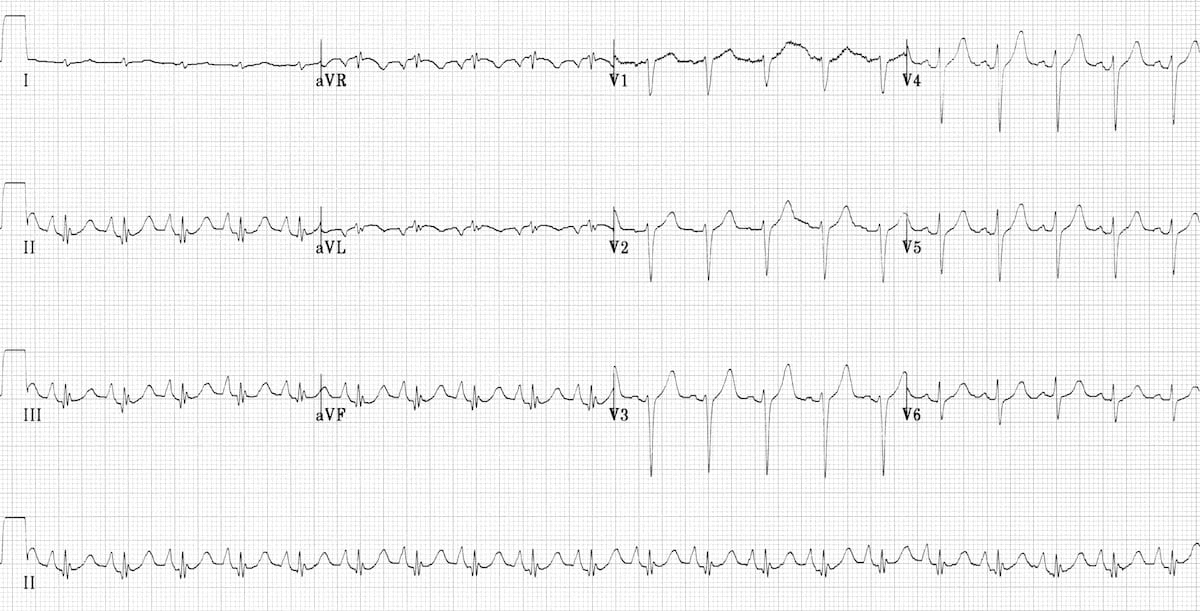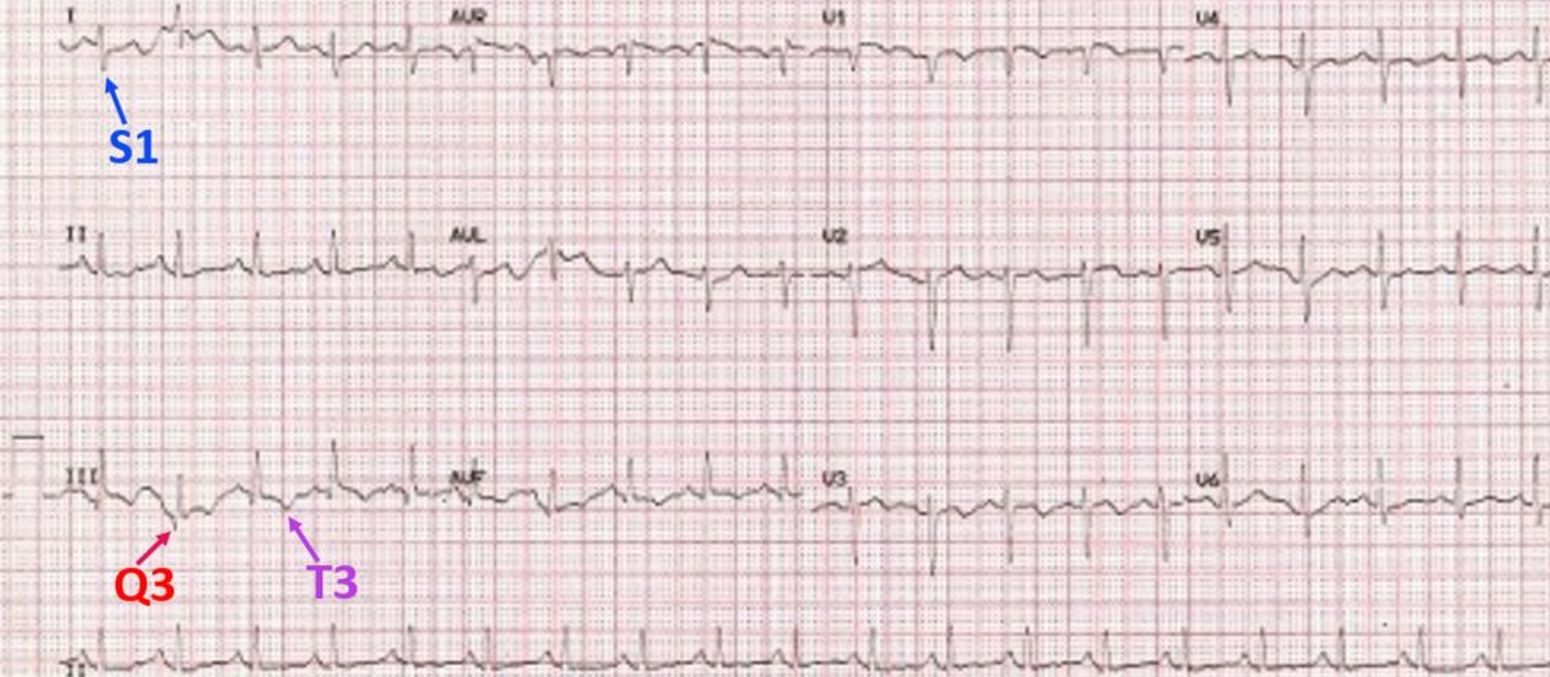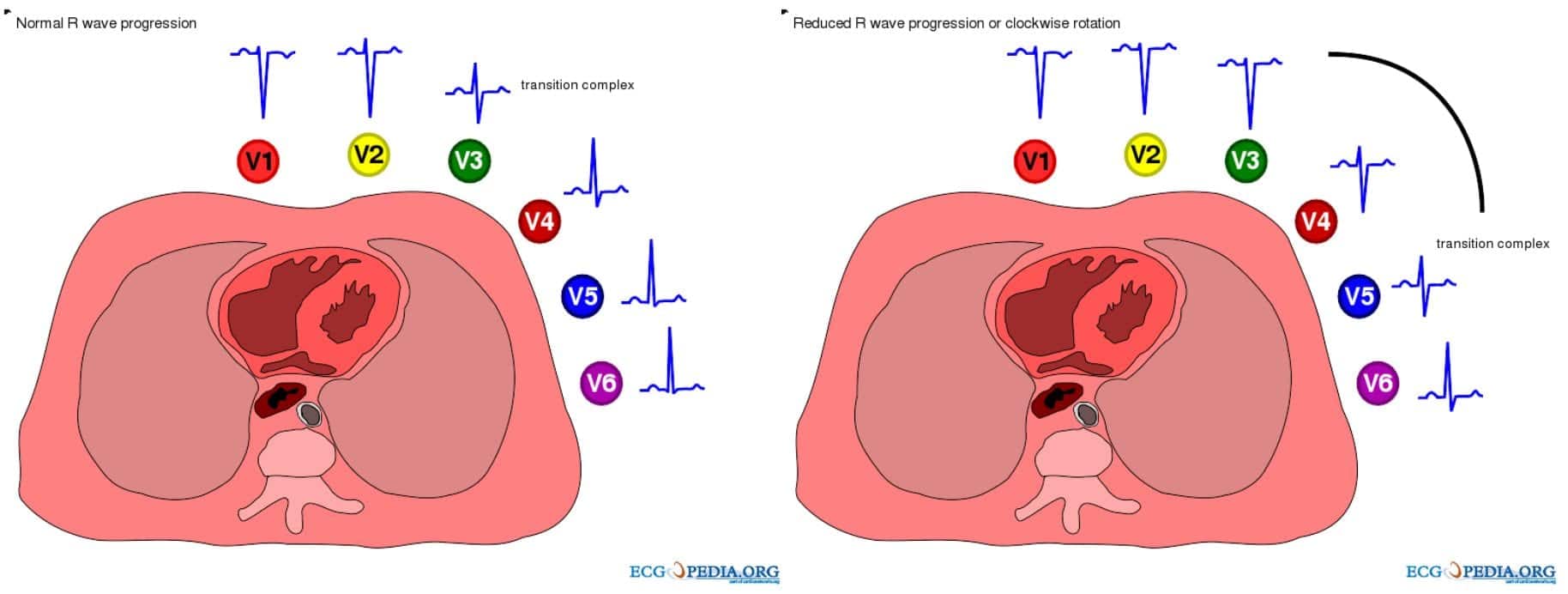Pulmonary Disease Pattern Ecg
Pulmonary Disease Pattern Ecg - To evaluate the extent and diagnostic values of ecg changes among copd patients suffering from broad spectrum of respiratory diseases. Web cvd indicates cardiovascular disease; Web the following ecg signs reflecting ccp were collected: Web chronic obstructive pulmonary disease often causes a characteristic electrocardiographic pattern that reflects mainly the low diaphragm resulting from the increased lung volume. And third, to review the abnormalities of cardiac rhythm that occur most often in patients w. Second,to describe the special ecg abnormalities that suggest acute superimposed illness (these have prognostic or therapeutic significance); • right axis deviation or vertical axis of the qrs complex. Increased stimulation of the sympathetic nervous system due to pain, anxiety and hypoxia. First, to review the ecg patterns that suggest the presence of underlying copd; The presence of hyperexpanded emphysematous lungs within the chest; This pattern is characterized by a large s wave in lead i, a q wave in lead iii, and an inverted t wave in lead iii. The presence of hyperexpanded emphysematous lungs within the chest; Screening for colorectal cancer screening for hypertension screening for lung cancer screening for prediabetes and type 2. Ecg changes commonly associated with pulmonary diseases such as copd. Web electrocardiography (ecg) is a useful adjunct to other pulmonary tests because it provides information about the right side of the heart and therefore pulmonary disorders such as chronic pulmonary hypertension and pulmonary embolism. First, to review the ecg patterns that suggest the presence of underlying copd; Web mechanism of ecg changes in copd: Web chronic obstructive pulmonary disease often causes a characteristic electrocardiographic pattern that reflects mainly the low diaphragm resulting from the increased lung volume. Web electrocardiographic (ecg) findings may help in clinical decision making regarding this disease entity. Web the electrocardiogram is often abnormal in patients who have chronic obstructive pulmonary disease. We found a similar pattern in the low. Ecgs were interpreted blindly in 63 patients with severe copd (group 1) versus 83 patients with mild or moderate copd (group 2). Web electrocardiographic (ecg) findings may help in clinical decision making regarding this disease entity. Our aim was to separate the effects on ecg by airway obstruction, emphysema and right ventricular. Web formal pulmonary function tests: Dilation of the right atrium and right ventricle with consequent shift in the position of the heart. Increased stimulation of the sympathetic nervous system due to pain, anxiety and hypoxia. And third, to review the abnormalities of cardiac rhythm that occur most often in patients w. The presence of hyperexpanded emphysematous lungs within the chest; Dilation of the right atrium and right ventricle with consequent shift in the position of the heart. Web this article has three purposes: Web ecg changes in pe are related to: Web electrocardiography (ecg) is a useful adjunct to other pulmonary tests because it provides information about the right side of the heart and therefore pulmonary disorders such as chronic. Our aim was to separate the effects on ecg by airway obstruction, emphysema and right ventricular (rv) afterload in patients with copd. Increased stimulation of the sympathetic nervous system due to pain, anxiety and hypoxia. Web the electrocardiogram is often abnormal in patients who have chronic obstructive pulmonary disease. Web cvd indicates cardiovascular disease; Second,to describe the special ecg abnormalities. Web in copd, the various pathophysiological mechanisms modify the ecg differently. Ecg findings often suggest right ventricular pressure overload or strain. And third, to review the abnormalities of cardiac rhythm that occur most often in patients w. (2) an s 1 s 2 s 3 pattern, a relatively uncommon finding not highly specific for copd 13 that reflects an anomalous. Web the electrocardiogram is often abnormal in patients who have chronic obstructive pulmonary disease. Ecg findings often suggest right ventricular pressure overload or strain. Web the electrocardiogram is often abnormal in patients who have chronic obstructive pulmonary disease. Web electrocardiography (ecg) is a useful adjunct to other pulmonary tests because it provides information about the right side of the heart. We found a similar pattern in the low. The presence of hyperexpanded emphysematous lungs within the chest; Web cvd indicates cardiovascular disease; Ecgs were interpreted blindly in 63 patients with severe copd (group 1) versus 83 patients with mild or moderate copd (group 2). Web the electrocardiogram is often abnormal in patients who have chronic obstructive pulmonary disease. Web electrocardiography (ecg) is a useful adjunct to other pulmonary tests because it provides information about the right side of the heart and therefore pulmonary disorders such as chronic pulmonary hypertension and pulmonary embolism. Web formal pulmonary function tests: The presence of hyperexpanded emphysematous lungs within the chest; Ecg changes commonly associated with pulmonary diseases such as copd. Web cvd. Web ecg abnormalities are common in patients with pulmonary embolism, with the most frequent being sinus tachycardia, right ventricular strain, and the classic s1q3t3 pattern. Web ecg changes occur in chronic obstructive pulmonary disease (copd) due to: We found a similar pattern in the low. Dilation of the right atrium and right ventricle with consequent shift in the position of. Web objective patients with chronic obstructive pulmonary disease (copd) often have abnormal ecgs. Web in copd, the various pathophysiological mechanisms modify the ecg differently. We found a similar pattern in the low. Web the electrocardiogram is often abnormal in patients who have chronic obstructive pulmonary disease. Web electrocardiography (ecg) is a useful adjunct to other pulmonary tests because it provides. Ecgs were interpreted blindly in 63 patients with severe copd (group 1) versus 83 patients with mild or moderate copd (group 2). And third, to review the abnormalities of cardiac rhythm that occur most often in patients w. • right axis deviation of the p waves. (2) an s 1 s 2 s 3 pattern, a relatively uncommon finding not highly specific for copd 13 that reflects an anomalous wave front rightward and superiorly. Web the following ecg signs reflecting ccp were collected: Second,to describe the special ecg abnormalities that suggest acute superimposed illness (these have prognostic or therapeutic significance); • right axis deviation or vertical axis of the qrs complex. Screening for colorectal cancer screening for hypertension screening for lung cancer screening for prediabetes and type 2. Web based on the low voltage in leads v 1, v 2, v 3, the rightward frontal plane axis, incomplete right bundle branch block (rbbb), and persistent precordial s waves, the computer interpreted the overall pattern as consistent with pulmonary disease. Web ecg changes in pe are related to: Web objective patients with chronic obstructive pulmonary disease (copd) often have abnormal ecgs. The prevalence of some electrocardiographic (ecg) abnormalities in severe versus mild or moderate chronic obstructive pulmonary disease (copd) has been reported. Copd is associated with increased airway resistance, alveolar and pulmonary capillary destruction, air trapping, chronic hypoxemia and increased work of breathing. Web formal pulmonary function tests: Web cvd indicates cardiovascular disease; Web ecg abnormalities are common in patients with pulmonary embolism, with the most frequent being sinus tachycardia, right ventricular strain, and the classic s1q3t3 pattern.Pulmonary Embolism (PE) Causes, symptoms, diagnosis, treatment
Pulmonary Disease Pattern On Ekg Pattern.rjuuc.edu.np
The ECG's of Pulmonary Embolism Resus
S1Q3T3 on ECG in a patient with Acute Pulmonary Embolism GrepMed
ECG in Chronic Obstructive Pulmonary Disease • LITFL • ECG Library
pulmonary disease pattern ecg Hình ảnh có liên quan Diseases Club
Pulmonary Embolism ECG New Health Advisor
Pulmonary embolism and S1Q3 pattern Cardiocases
ECG in Chronic Obstructive Pulmonary Disease • LITFL • ECG Library
ECG in Chronic Obstructive Pulmonary Disease • LITFL • ECG Library
We Found A Similar Pattern In The Low.
This Pattern Is Characterized By A Large S Wave In Lead I, A Q Wave In Lead Iii, And An Inverted T Wave In Lead Iii.
To Evaluate The Extent And Diagnostic Values Of Ecg Changes Among Copd Patients Suffering From Broad Spectrum Of Respiratory Diseases.
Web Mechanism Of Ecg Changes In Copd:
Related Post:









